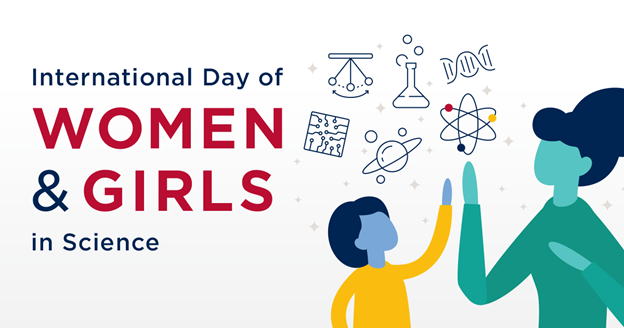The International Day of Women and Girls in Science is an annual observance adopted by the United Nations General Assembly to promote the full and equal access and participation of females in Science, Technology, Engineering and Mathematics fields. The Amazons Watch Magazine is committed to continually highlighting the giant strides of women from Africa and the rest of the world. Shining a spotlight on women and girls in Science is one of our priorities.
This day is an opportunity to promote full and equal access and participation in Science for women and girls. It is an excellent truth that gender equality is a global priority for UNESCO, and the continual support of young girls, their education, and their full ability to harness their ideas have been heard for the development and peace of the country.
This day reminds us at Amazon that our girls and women are vital and play a critical role in science and technology communities. Women should strengthen their participation; it gives us great pride to celebrate these women and this special day.
In recent times women have been compared to men, saying that women are underrepresented in science fields. However, in the present day, these barriers to female participation are still persistent and are currently significant social barriers. Worldwide, there are regional differences in the walls to female involvement in the sciences.
The Assembly brings together representatives of a member of states and representatives of international organisations, the private sector and leading scientists to discuss measures and initiatives to promote the participation of females in STEM.
Some reasons have been explored as to why fewer girls and women are working in Science, technology, engineering and mathematics (STEM) and what continues to happen in these fields. The theme of this special day is to bring Everyone forward for Sustainable and Equitable Development. In recent years the theme has consistently changed following the various editions.
A question that will always come up from time to time is, “why aren’t more girls and women taking up careers in STEM subjects?” This is a complicated question, and several answers have been suggested. Some suggest that girls have less experience with activities and toys that encourage an interest in Science but instead have dolls and doll houses. Some say that girls are more critical of their abilities and tend to underrate themselves, instilling that they are incapable or ‘good enough’ to take such STEM subjects in school.
Women and girls must get involved in Science because they can play a vital role in ensuring diversity in research, thereby diversifying and expanding the pool of talented researchers and bringing in fresh perspectives. Our philosophy at Amazons is rooted in the preservation of the pride and dignity of women through an objective reportage on gender inequalities and social injustices experienced by women.
The number of women working, studying, and researching Science has significantly increased over recent decades, and they are playing a huge role in pushing Science to greater heights. According to an Elsevier report, female researchers today are on the. As awareness about this grows, so does the gap in participation due to factors ranging from the absence of encouragement to pessimistic peer pressure.
Many organisations are getting on board with effort as understanding comes up regarding the well-being of welcoming more women and girls into STEM studies and careers. Many structures and entities are strenuously working to level the playing field.
The importance of continuing the problematic work toward gender equality in leadership and decision-making positions is now said to be that women scientists are looked up to as role models and that we must inspire girls and women to be whatever they want to be and to do whatever they feel they are best. However, changes and advancements in the system could be faster and considered painful.
Empowering women and promoting gender equality are central to sustainable development. Creating diversity in scientific institutions, whether large or small, is critical in accomplishing goals. It is now in our own best interest that we show them that it is very much possible and that it will motivate many to follow in our footsteps.
The International Day of Women and Girls in Science is an annual observance adopted by the United Nations General Assembly to promote the full and equal access and participation of females in Science, Technology, Engineering and Mathematics fields. The Amazons Watch Magazine is committed to continually highlighting the giant strides of women from Africa and the rest of the world. Shining a spotlight on women and girls in Science is one of our priorities.
This day is an opportunity to promote full and equal access and participation in Science for women and girls. It is an excellent truth that gender equality is a global priority for UNESCO, and the continual support of young girls, their education, and their full ability to harness their ideas have been heard for the development and peace of the country.
This day reminds us at Amazon that our girls and women are vital and play a critical role in science and technology communities. Women should strengthen their participation; it gives us great pride to celebrate these women and this special day.
In recent times women have been compared to men, saying that women are underrepresented in science fields. However, in the present day, these barriers to female participation are still persistent and are currently significant social barriers. Worldwide, there are regional differences in the walls to female involvement in the sciences.
The Assembly brings together representatives of a member of states and representatives of international organisations, the private sector and leading scientists to discuss measures and initiatives to promote the participation of females in STEM.
Some reasons have been explored as to why fewer girls and women are working in Science, technology, engineering and mathematics (STEM) and what continues to happen in these fields. The theme of this special day is to bring Everyone forward for Sustainable and Equitable Development. In recent years the theme has consistently changed following the various editions.
A question that will always come up from time to time is, “why aren’t more girls and women taking up careers in STEM subjects?” This is a complicated question, and several answers have been suggested. Some suggest that girls have less experience with activities and toys that encourage an interest in Science but instead have dolls and doll houses. Some say that girls are more critical of their abilities and tend to underrate themselves, instilling that they are incapable or ‘good enough’ to take such STEM subjects in school.
Women and girls must get involved in Science because they can play a vital role in ensuring diversity in research, thereby diversifying and expanding the pool of talented researchers and bringing in fresh perspectives. Our philosophy at Amazons is rooted in the preservation of the pride and dignity of women through an objective reportage on gender inequalities and social injustices experienced by women.
The number of women working, studying, and researching Science has significantly increased over recent decades, and they are playing a huge role in pushing Science to greater heights. According to an Elsevier report, female researchers today are on the. As awareness about this grows, so does the gap in participation due to factors ranging from the absence of encouragement to pessimistic peer pressure.
Many organisations are getting on board with effort as understanding comes up regarding the well-being of welcoming more women and girls into STEM studies and careers. Many structures and entities are strenuously working to level the playing field.
The importance of continuing the problematic work toward gender equality in leadership and decision-making positions is now said to be that women scientists are looked up to as role models and that we must inspire girls and women to be whatever they want to be and to do whatever they feel they are best. However, changes and advancements in the system could be faster and considered painful.
Empowering women and promoting gender equality are central to sustainable development. Creating diversity in scientific institutions, whether large or small, is critical in accomplishing goals. It is now in our own best interest that we show them that it is very much possible and that it will motivate many to follow in our footsteps.





Comments are closed.